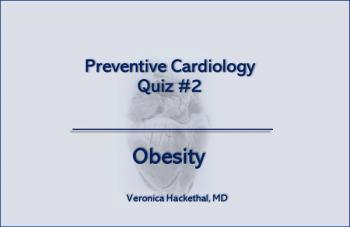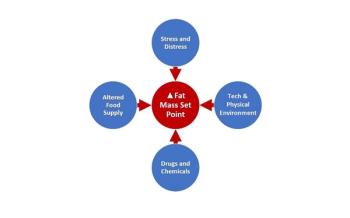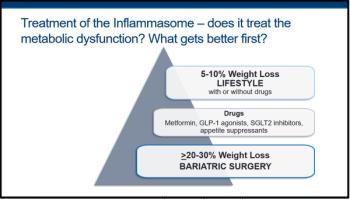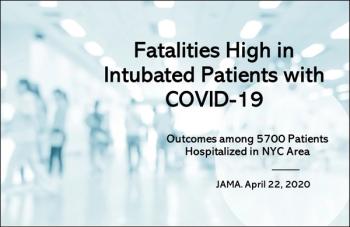
Weight loss is essential to arrest the cardiovascular disease and metabolic dysfunction linked to obesity. What do you know about the drugs now available that may help?

Weight loss is essential to arrest the cardiovascular disease and metabolic dysfunction linked to obesity. What do you know about the drugs now available that may help?

New research from Sweden shows patients who have received bariatric surgery live 3 years longer, on average, than those given conventional treatment for their obesity.

The health benefits of sustained weight loss for persons with obesity could be a valuable topic when a discussion is opened.

New CDC data show 12 states had an adult obesity prevalence of ≥35% in 2019 compared to 9 states in 2018 and 6 states in 2017.

Youth who experienced weight stigma prior to COVID-19 were 3-times more likely to engage in binge eating during the pandemic vs those who had not, a new study found.

In patients with obesity and type 2 diabetes, metabolic improvements were similar after weight loss induced by surgery or a low-calorie diet.

Patients with severe obesity are 4-times as likely to die from COVID-19, a new study finds, with younger patients and men with obesity at highest risk.

In this 8-part video series, obesity expert Donna Ryan, MD, talks about the danger of COVID-19 for obesity patients, challenges facing PCPs of caring for this population, and more.

If we understand how the disease of obesity compounds COVID-19 severity, how do we put that knowledge to work?

VIDEO: Obesity is a chronic, relapsing disease that threatens to neutralize, even reverse, years of progress in reducing CVD-related death. Ted Kyle, RPh, explores.

Obesity is a primary risk factor for cardiovascular disease and can also be modified with comprehensive care. Test yourself on the AHA/ACC recommendations for that care.

Jorge Plutzky, MD, director of the Preventive Cardiology Program at Brigham and Women's Hospital, discusses the insidious role diabetes plays in cardiovascular disease.

The physiology of obesity makes weight loss, by itself, unlikely to successfully treat the chronic disease of obesity. What does this mean for primary care clinical strategies?

Why are people with obesity at high risk for severe COVID-19 infection? Dr Caroline Apovian explains that immunity in this population has begun to senesce.

Metabolic and bariatric surgery are deemed "elective," along with cosmetic procedures, and still widely postponed. "Resume these life-saving procedures, now," says the ASMBS.

Roux-en-Y gastric bypass remains the gold standard of bariatric surgery. Obesity and nutrition expert Caroline Apovian, MD, explains why and how it differs from the 3 other types of weight loss surgery.

From highest percentage of obese children to lowest percentage of adults with high cholesterol, see how obesity hits home state by state in our new slideshow.

The structural changes created in bariatric surgery increase the release of gut hormones that communicate satiety to the brain.

Changes in primary care for obesity have moved rapidly in some ways but less so in others. Obesity medicine advocate Ted Kyle details the overall steady progress.

The metabolic pathology that underlies obesity must be addressed through medication or bariatric surgery or significant weight loss will be transient.

Healthy white adipose tissue helps regulate endocrine activity that protects metabolic function. Dr Caroline Apovian explains how this function deteriorates as obesity progresses.

Patients with obesity may require long-term pharmacologic management to sustain weight loss. Obesity expert Donna Ryan, MD, talks about new drugs in the pipeline.

Study: Nearly 90% of inpatients with COVID-19 on mechanical ventilation died; obesity, diabetes, hypertension common among the 5700 patients.

Obesity Medicine is a young specialty but is expanding quickly in response to the global epidemic of obesity and the many chronic diseases it causes.

In the US, where 40% of adults meet criteria for obesity, results of 2 new case series have important clinical implications for patient care during the pandemic.